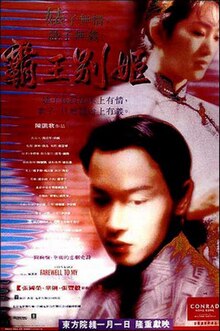Farewell My Concubine (film)
| Farewell My Concubine | |
|---|---|

Theatrical release poster
|
|
| Traditional | 霸王別姬 |
| Simplified | 霸王别姬 |
| Mandarin | Bàwáng Bié Jī |
| Literally | The Hegemon-King Bids Farewell to His Concubine |
| Directed by | Chen Kaige |
| Produced by | Hsu Feng |
| Screenplay by |
Lilian Lee Lu Wei |
| Based on |
Farewell My Concubine by Lilian Lee rewritten from Qiuhaitang (秋海棠) by Qin Shouou () |
| Starring | |
| Music by | Zhao Jiping |
| Cinematography | Gu Changwei |
| Edited by | Pei Xiaonan |
|
Production
company |
Beijing Film Studio
|
| Distributed by | Miramax Films (US) |
|
Release date
|
|
|
Running time
|
171 minutes 157 minutes (US - Theatrical release only) |
| Country | China |
| Language | Mandarin |
| Box office | $5,216,888 |
Farewell My Concubine is a 1993 Chinese drama film directed by Chen Kaige. It is one of the central works of the Fifth Generation movement that brought Chinese film directors to world attention. Similar to other Fifth Generation films like To Live and The Blue Kite, Farewell My Concubine explores the effect of China's political turmoil during the mid-20th century on the lives of individuals, families, and groups. In this case, the affected are two male stars in a Peking opera troupe and the woman who comes between them.
The film is an adaptation of the novel by Lilian Lee, who is also one of the film's screenplay writers. Hong Kong actor Leslie Cheung was used in the film to attract audiences because melodramas are not a popular genre. (Cheung's voice is dubbed by Beijing actor Yang Lixin.) Due to Gong Li's international stardom, she was cast as one of the main characters in the film.
Farewell My Concubine remains to date the only Chinese-language film to win the Palme d'Or at the Cannes Film Festival.
Chen Kaige was first given a copy of Lilian Lee's novel in 1988, and although Chen found the story of the novel to be "compelling", he found the emotion subtext of the novel "a bit thin". After meeting with Lee, they recruited Chinese writer Lu Wei for the screenplay, and in 1991 the first draft of the screenplay came about.
As the film opens, a street crowd watches a troupe of boys perform Peking opera, supervised by their aging director, Master Guan. When Laizi attempts to run away, Shitou placates the crowd by breaking a brick on his head; the crowd cheers, but Shitou is later punished for the stunt. An onlooking mother brings her son to the troupe to be trained, using a cleaver to amputate her child's objectionable superfluous finger, and marking the contract with her thumb print in the blood. Shitou welcomes the newcomer as "Douzi" (bean), and the two boys become friends.
...
Wikipedia
